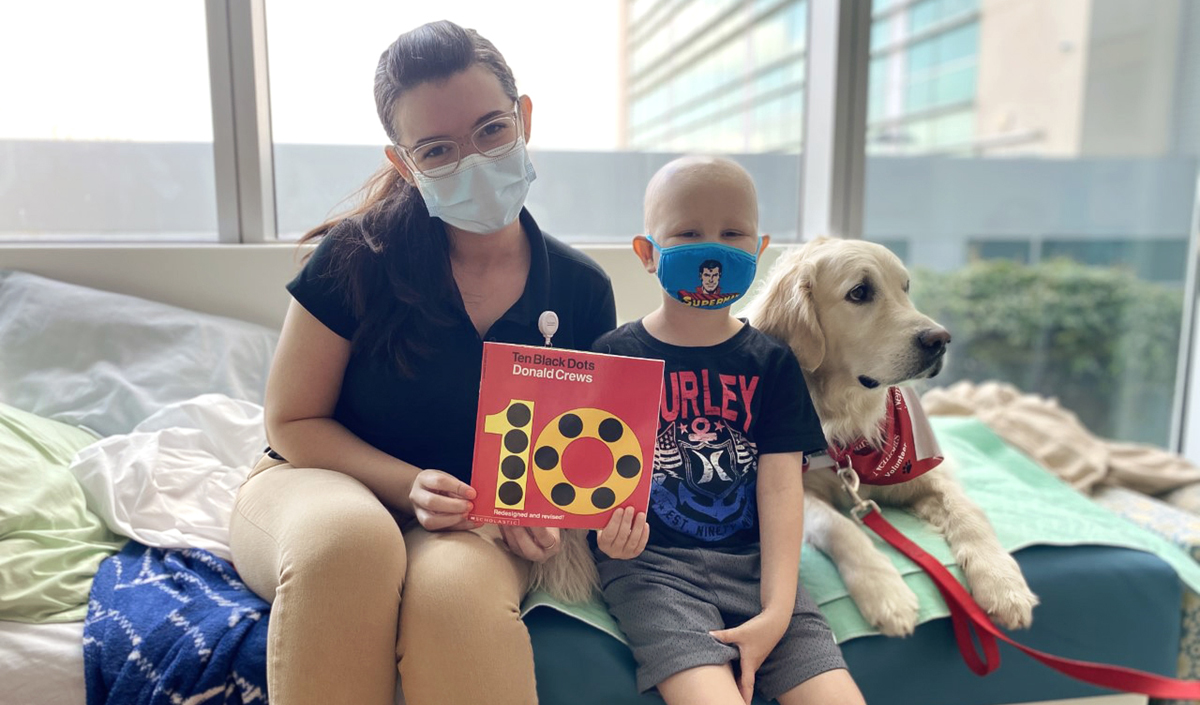UCF PedsAcademy, a pediatric school program, has partnered with READing Paws to inspire a love of reading in patients at Nemours Children’s Hospital.

Five-year-old Kade King (middle) will be reading Ten Black Dots to visitor Halo the golden retriever (right), alongside UCF PedsAcademy intern Karla Sanabria Matos (left).
Golden retriever Halo hops onto the hospital bed and cozies up beside five-year-old Kade King, a patient at Nemours Children’s Hospital. Once they are settled, Kade begins reading to his four-legged visitor. "Two dots can make the eyes of a fox. One. Two." With his head on his paws and big brown eyes staring intently, Halo seems to be listening to every word of Ten Black Dots. While Kade reads, a UCF PedsAcademy intern points to each dot on the page. The eyes of a fox. One. Two. Halo’s ears perk up. Pleased, Kade reads on.
Halo’s most remarkable skill is not to roll over or jump through a hoop but to sit patiently as children read to him. He’s a canine recruit from READing Paws, a program that pairs young readers with trained therapy dogs. Shyness, anxiety or learning difficulties can make reading aloud scary, so this research-based program helps children practice reading to dogs who ‘listen’ without judgment. UCF PedsAcademy at Nemours Children's Hospital, a pediatric school program aimed at keeping patients engaged academically during hospitalization, has partnered with READing Paws to bring the program to children with extended hospital stays.
Through the partnership, PedsAcademy interns and READing Paws therapy dogs help patients gain confidence and improve their reading skills in a positive, risk-free environment. Therapy dogs are trained to work with young readers, such as looking at pictures, following as pages are turned or responding to prompts from handlers.
Rebeca Grysko, the school program coordinator for PedsAcademy, says children with chronic health conditions often experience challenges with school performance, including reduced attention and concentration, poor motivation, and low self-esteem. But she says research has shown that children who participate in programs like READing Paws demonstrate greater confidence, self-esteem and motivation to read. “Educational programs such as READing Paws are essential for patients’ academic skills and provide normalization during lengthy hospital stays. Motivation is the key to reading success for all children, but especially for those with chronic or complex medical issues.”
Beyond the many benefits to patients, participation in READing Paws has also proven to be a rewarding experience for PedsAcademy interns. UCF alum Karla Sanabria Matos ‘21 completed the PedsAcademy internship and received her bachelor’s degree in elementary education this spring. She says when a READing Paws therapy dog is listening, the environment is transformed. “These beautifully trained dogs help alleviate children’s feelings of anxiety or isolation that comes with long-term hospitalizations. This gives aspiring educators a chance to focus on read-aloud skills and literacy engagement.”
Grysko says through participation in the READing Paws program, PedsAcademy interns learn how to select appropriate books for readers, how to apply effective strategies for helping students decode unfamiliar words, and how to monitor and support children’s reading comprehension.
Sanabria Matos says PedsAcademy interns also learn how to work with the therapy dogs to best support their patient’s learning. “We are taught to tap on the book loudly to catch the dog’s attention. If the dog seems distracted, the handlers step in and shift the dog’s attention towards the book. Sometimes the dogs get a bit too comfy and fall asleep next to the patient, which never seems to upset anyone. Other times, the dogs don’t want to leave the room. When that happens, we tell patients it is because the dog must really like them. This always makes the kids giggle.”
These beautifully trained dogs help alleviate children’s feelings of anxiety or isolation that comes with long-term hospitalizations.
Karla Sanabria Matos ‘21
Sheila Roberts, Halo's READing Paws Handler, says PedsAcademy interns contribute significantly to the program's success. "They bring an energy the young readers enjoy," she says. "And the PedsAcademy interns quickly pick up on valuable skills they can use with the dogs as extra incentive for the children to read aloud."
Grysko says most of the PedsAcademy interns become classroom teachers in a traditional school setting after graduation and have learned essential skills of an effective reading teacher in the program. In addition, after witnessing the value of therapy dog-assisted activities, many express an interest in starting a READing Paws program at their future school.
Sanabria Matos says she hopes to return to the pediatric school setting after gaining three years of traditional classroom experience. She also intends to complete her master’s degree in exceptional student education. “I am confident the READing Paws program improved my skills as a teacher. We are exposed to such unique programs in the PedsAcademy internship that inspire us in our own pedagogical practices. I am a better educator now than I was in January, thanks to these opportunities.”